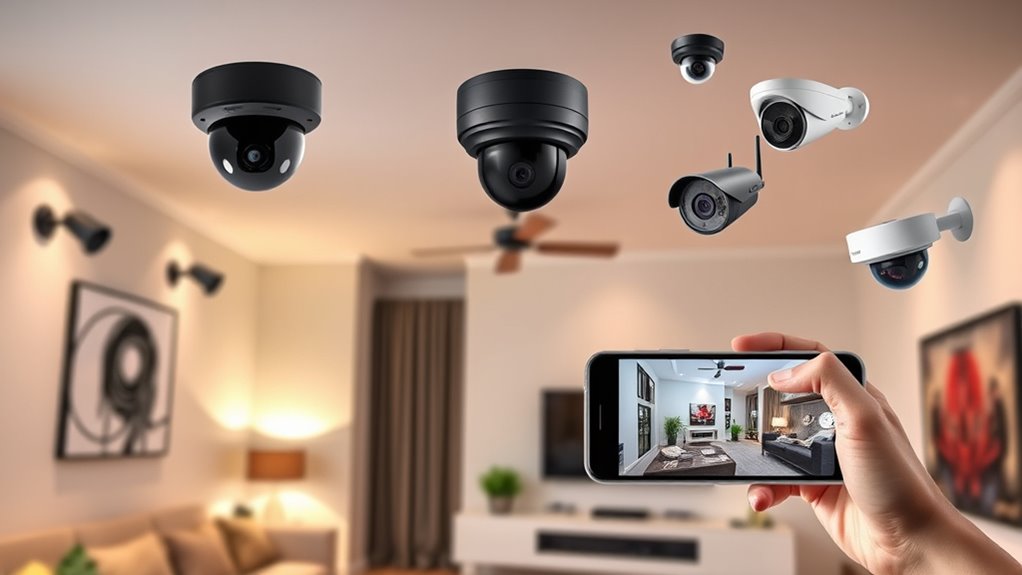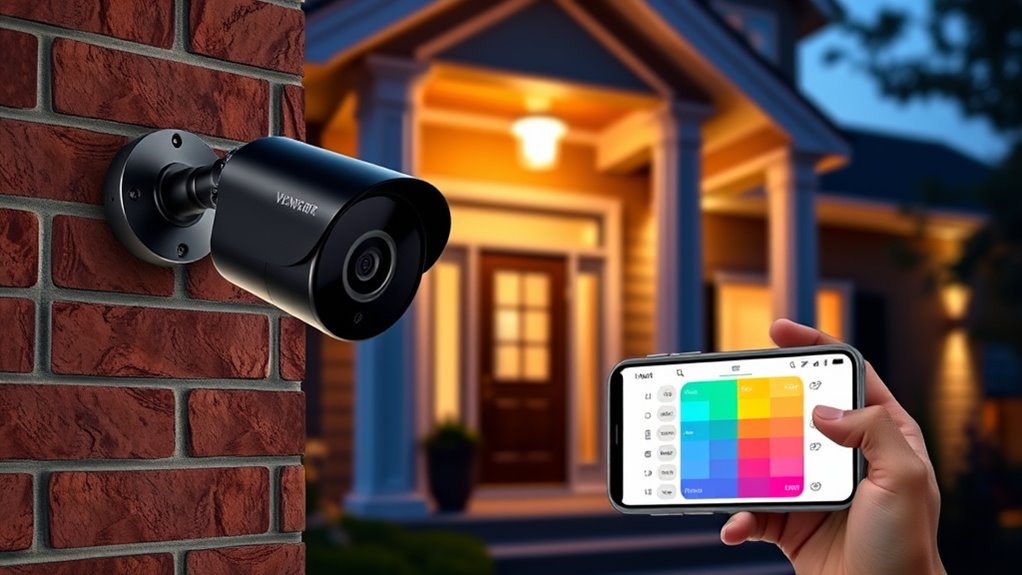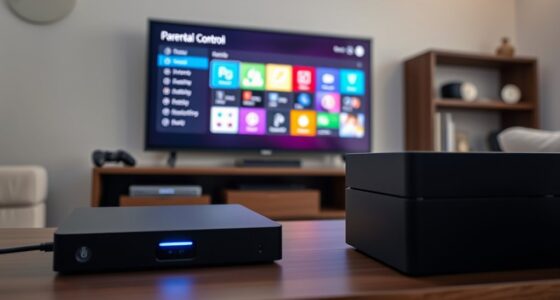To choose a home security camera system, consider your home’s connectivity and monitoring needs. Decide between wired or wireless cameras based on your Wi-Fi strength and installation preferences. Think about camera features like resolution, night vision, and coverage area to suit your specific spaces. Budget for options with the right storage, whether local or cloud-based, and look for compatible systems that integrate with your smart devices. Keep exploring to find the perfect setup that offers security and peace of mind.
Key Takeaways
- Assess your monitoring needs: indoor vs. outdoor, fixed vs. PTZ, and coverage area.
- Decide between wired and wireless cameras based on home connectivity and installation preferences.
- Evaluate video quality, night vision, and field of view to ensure clear, comprehensive surveillance.
- Consider storage options (local, cloud, hybrid) and data security features for privacy protection.
- Match features and budget, including smart integrations, alerts, and subscription costs, to find the best value.

Choosing a home security camera system can substantially enhance your safety and peace of mind. When deciding which system works best for you, start by considering the type of cameras you need. Wireless cameras are easy to install and can be repositioned without much hassle, making them ideal for quick setups or if you want flexibility. However, wired cameras tend to offer more reliable connectivity, especially in areas with weak Wi-Fi signals. Think about whether you’ll use the cameras indoors or outdoors. Outdoor cameras are built to withstand weather conditions, while indoor cameras focus on monitoring inside your home.
Choosing between wired and wireless cameras depends on your home’s connectivity and monitoring needs.
Next, evaluate the camera’s movement capabilities. Fixed cameras provide a consistent view, suitable for monitoring specific areas, but if you want a broader field of view or the ability to cover different angles, PTZ (pan-tilt-zoom) cameras are a smart choice. They can be remotely controlled to pan across a scene, tilt, or zoom in on details, giving you more flexibility. When it comes to video quality, higher resolution cameras like 4K models deliver sharper images, which can be essential when identifying details. Also, consider the camera’s field of view; wider angles, up to 180 degrees, let you cover more area with fewer cameras. Night vision is another indispensable feature for around-the-clock security, especially infrared or low-light capabilities that improve visibility in darkness.
Storage options also matter. Local storage, such as microSD cards or external hard drives, means you keep your footage on-site, often at no extra cost but with limited capacity. Cloud storage allows remote access and backup but usually involves ongoing subscription fees. Some systems combine both for added flexibility. Whichever you choose, guarantee your data is protected from unauthorized access. Connectivity plays a key role too. Cameras that connect via Wi-Fi are easy to set up, but Ethernet connections provide more stability. Compatibility with smart home platforms like Alexa or Google Home enhances usability, and mobile app control allows you to monitor your cameras remotely. Look for systems that support multiple cameras if you plan to expand your security setup.
Additionally, paying attention to privacy policy practices can help ensure your personal data is safeguarded when choosing a system. Budget influences your options considerably. Entry-level systems cost less but may lack advanced features, while premium models offer a suite of extras like motion detection, two-way audio, sirens, and floodlights. Remember that some features might come with ongoing subscription fees, especially for cloud storage or professional monitoring. When selecting a system, weigh initial costs against long-term expenses and benefits. Consider additional features carefully; motion alerts, two-way communication, and alarms can boost your security. Ultimately, choose a system that fits your specific needs, offers reliable performance, and provides peace of mind knowing your home is protected.
Frequently Asked Questions
Can Security Cameras Be Hacked Remotely?
Yes, security cameras can be hacked remotely if you’re not careful. Hackers often exploit weak passwords, outdated software, or unsecured Wi-Fi networks to gain access. They can intercept video streams or manipulate camera functions, leading to privacy invasions or security risks. To protect yourself, change default passwords, update firmware regularly, use encrypted connections, and avoid public Wi-Fi for remote access. Staying vigilant helps keep your security system safe from cyber threats.
What Is the Average Lifespan of a Security Camera?
Your security camera’s lifespan is like a quiet journey, usually lasting between 5 to 10 years. If you choose high-quality models and keep up with regular maintenance, they can serve you well for up to 25 years. Indoor cameras tend to last longer, while outdoor ones face more environmental challenges. By updating firmware and protecting them from the elements, you extend their quiet, dependable service and get the most out of your investment.
Are There Privacy Concerns With Outdoor Cameras?
You might wonder if outdoor cameras raise privacy concerns. Generally, placing cameras to cover your property and entry points is fine, but avoid pointing them directly at neighbors’ windows or private areas. Keep in mind that public spaces are less private, but respecting privacy laws and minimizing invasive angles helps. Informing others and securing footage also shows you’re mindful of privacy, reducing potential issues.
How Much Does a Professional Installation Typically Cost?
You’re probably wondering about the cost of professional installation. Usually, it averages around $1,297, with prices ranging from $594 to $2,039 or more. For an 8-camera system, expect to pay between $1,000 and $2,500, including setup. Labor rates vary from $80 to $200 per camera, and costs depend on system complexity, wired or wireless setup, and additional features.
Do Security Cameras Require Wi-Fi or Cellular Data?
Security cameras can connect via Wi-Fi or cellular data, depending on your needs. Wi-Fi cameras rely on a stable internet signal in your home or business, offering affordability but limited flexibility. Cellular cameras use cellular networks, providing portability and protection, especially in remote or Wi-Fi-deprived areas. Both options deliver dynamic, high-definition video, but cellular cameras often boast better security and broader placement possibilities, making them ideal for diverse security scenarios.
Conclusion
Now that you know what to look for, choosing a home security camera system becomes easier than ever. Trust your instincts, and pick a setup that fits your needs perfectly—your home’s safety depends on it. With the right system, you’ll feel safer than you ever thought possible, like having an invisible shield protecting your loved ones around the clock. Don’t wait—take action today and turn your home into an impenetrable fortress.










